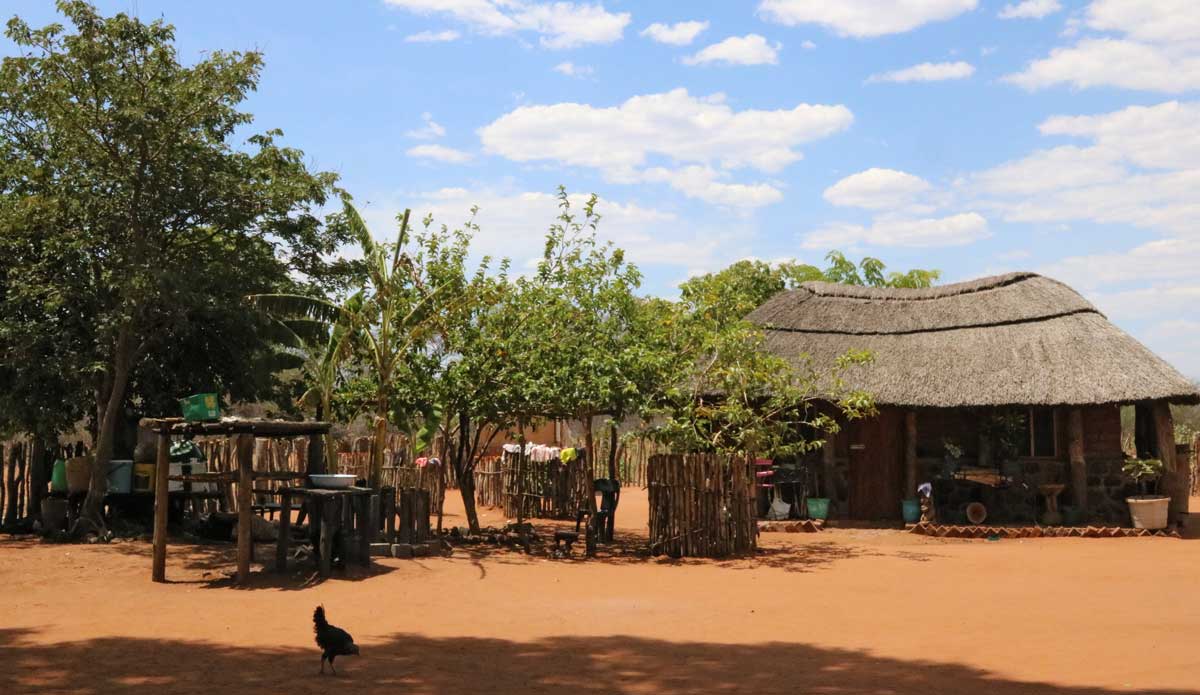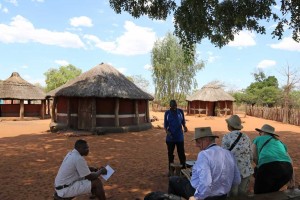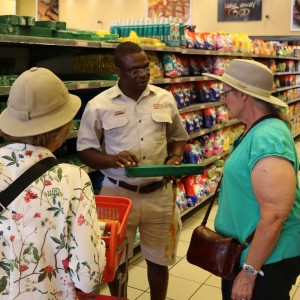 A full day in Victoria Falls (Zimbabwe), beginning with an early-morning game drive (5:30am????), followed by a visit to an off-the-grid village, and finished with a dinner boat cruise on the river.
A full day in Victoria Falls (Zimbabwe), beginning with an early-morning game drive (5:30am????), followed by a visit to an off-the-grid village, and finished with a dinner boat cruise on the river.
It was the village visit that stood out from everything else. We’d been to Tanzania previously, and seen all the Masai villages close to the highway, each one looking just like the last except for perhaps a different ratio of tour busses to vans parked in front. We hadn’t stopped at one in Tanzania, because they all looked just a little bit staged. I assumed the same would be true today; I couldn’t have been more wrong. Our tour guide drove down a lengthy deserted dust track into this “village” which is really a collection of homesteads, each one belonging to a particular family. No running water, no electricity, and even money is something of an inconvenience for them since they have no means to accumulate it (they don’t use banks but rather barter/trade for just about everything, and money requires that you go into town).
 This was to be interactive, and out tour guide was rather stern with us ahead of time on this point… we were to ask any and all questions that came to mind, regardless of political correctness or how dumb they sounded. That included an interesting discussion on politics, NGOs (non-government organizations) and more. Our host spoke reasonably-good English and understood it even better. I asked him about the changes he’s seen in the last 20 years (he’s 48), and he replied that there was nothing positive he could come up with. Most of the negatives dealt with the massive departure of the NGOs when the government changed the terms of the deal they had with the predominantly-white land owners, confiscating property instead of buying it from them. The changed view of “outsiders” scared off the NGOs and investment (but was seen as a necessary act after 10 years of government inaction on plans to turn the land back over to its original owners, native Zimbabwians).
This was to be interactive, and out tour guide was rather stern with us ahead of time on this point… we were to ask any and all questions that came to mind, regardless of political correctness or how dumb they sounded. That included an interesting discussion on politics, NGOs (non-government organizations) and more. Our host spoke reasonably-good English and understood it even better. I asked him about the changes he’s seen in the last 20 years (he’s 48), and he replied that there was nothing positive he could come up with. Most of the negatives dealt with the massive departure of the NGOs when the government changed the terms of the deal they had with the predominantly-white land owners, confiscating property instead of buying it from them. The changed view of “outsiders” scared off the NGOs and investment (but was seen as a necessary act after 10 years of government inaction on plans to turn the land back over to its original owners, native Zimbabwians).
So seriously not what you’d expect on an African tour! My biggest takeaway was the importance of NGOs, something I’ve always had a somewhat cynical eye towards in the past. And bicycles… darned few of them because they’re just too expensive, so people walk everywhere. Having a bicycle is seen as something of a status symbol.
A bit more on this village. Until recently, water was brought in from a well 5 kilometers away. An NGO built a new well much closer, and while you’d think a village might normally finance and build its own well, that’s not how things work when you have no means or culture to accumulate anything beyond what you need for the next season. NGOs also provided concrete and plans for outhouses, which most now have. No plans for electricity or running water. Cell phones? Yes, the younger members have them, and they’re charged off solar panels.
 All in all a very fascinating three hours. Ah, one last thing. The guide suggested that instead of offering them money, we go to a local grocery store and buy them sugar, rice, oil and soap. Things that, to this village, have more value than money. Interesting thing, that. We value money higher because it gives us the flexibility to buy what we want, when we want. They’d rather have what they need, and to them, there’s a disconnect between money and having things.
All in all a very fascinating three hours. Ah, one last thing. The guide suggested that instead of offering them money, we go to a local grocery store and buy them sugar, rice, oil and soap. Things that, to this village, have more value than money. Interesting thing, that. We value money higher because it gives us the flexibility to buy what we want, when we want. They’d rather have what they need, and to them, there’s a disconnect between money and having things.
Getting late; another big day tomorrow.





